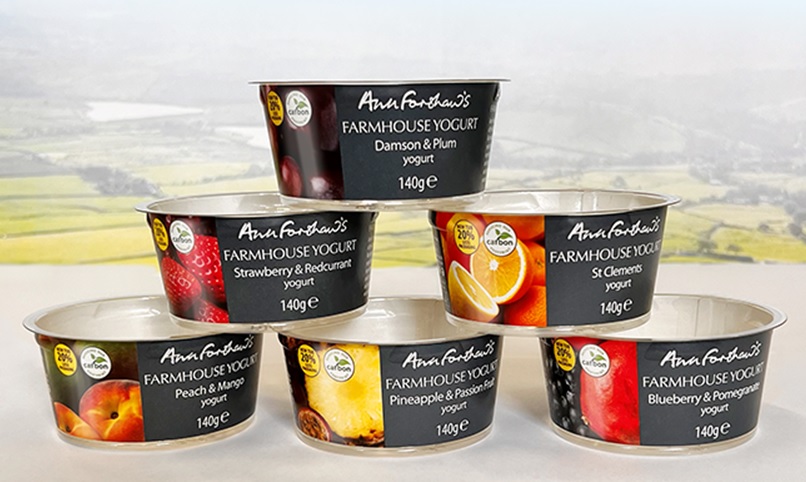
Alston Dairy produces the ‘Ann Forshaw’s’ branded yoghurt using milk yielded from the farm’s herd of 350 British Friesians. Based in Longridge, Preston, the dairy is renowned for its ‘from cow to pot in 24 hours’ process, with the milk sometimes only being a few hours old.
The business has expanded over the past 50 years, with yoghurt production being introduced in 1982. Ann Forshaw’s Farmhouse yoghurts are stocked by major supermarkets such as Waitrose, Sainsburys, Co-op, Morrisons and Booths in the North West.
Innovation, Sustainability & Creativity
For IMPAC-T, we took an existing hybrid pack format and through innovative processes, enabled a higher volume of post-consumer recycled PET to be used, dramatically increasing the sustainability of the pack. An inline manufacturing process inherently requires less energy to manufacture circular economy packaging.
IMPAC-T uses a minimum of 50% post-consumer recycled PET with the ability of up to 100%. The card wrap uses up to 100% post-consumer waste with any virgin content sourced from certified sustainable forestry.
Both the plastic and card can be easily separated by the consumer for onward recycling and the materials can be reprocessed back into packaging.
The IMPAC-T process offers a 46% carbon footprint reduction compared to the current assembly system (independently verified by Comply Direct).
Business Founder Ann Forshaw said: “Sustainability is very important to us. We are very proud that 100% of the milk that goes into our yogurts comes directly from our family-run farm and is pumped directly into our dairy so there are zero food miles. A fully and easily recyclable pot is key to maintaining a low carbon footprint for our yogurt.”
Ian Smith, PFF Group sales director said: “PFF has supplied packaging to Alston Dairy for more than a decade and we know how important sustainability is to the business and its customers.
“Our IMPAC-T product uses less plastic than equivalent PET packaging and has been introduced amid increasing demand from food manufacturers, retailers and the public alike for plastic reduction. The packaging has the potential to revolutionise the dairy sector, as well as other food sectors where sealed-in freshness, strong branding and lower carbon footprint is essential.”
Recycled Plastic – Recycled Card – Separate & Recycle Again!
Return to Case Studies